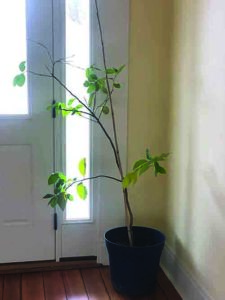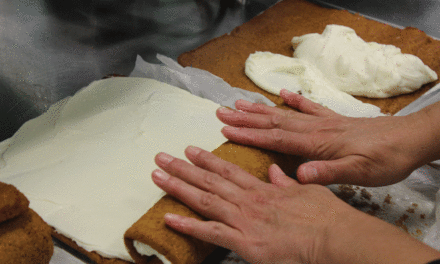
Though said to be able to survive sub-freezing temperatures, the author’s lemon tree, right, spends the fall and winter months indoors near a sunny window before being returned to its perch on the front step. (Photo by Leslie Milby)
For years I’d flip past the citrus section of plant catalogs, with just a hint of jealousy, sighing to myself that I’ll just take my Corona without a hint of lime and that plain ole’ water would suffice in summer rather than fresh squeezed lemonade.
But one fine day I was chatting with a friend who mentioned in passing that she had a lemon tree.
My mind instantly went to, “I didn’t know she had a greenhouse!”
Indeed, she did not, she had a mini Meyer tree perched on her windowsill, and yes, it did bear fruit and yes, she bought at one of the local nurseries.
I was hung up for a year or so, waiting while we remodeled our house, but I’ll tell you, the hint dropping to my husband was heavy. As well as detailed.
“Stop at Robin’s Nest on your way home” … and “I have a spot on the windowsill.”
Imagine my surprise when the UPS driver lugs out this large — as in, taller than me with one of my monkey children on my shoulders — box out of the truck. While my darling heard my hints about a lemon tree, he apparently did not hear the windowsill portion and ordered a full size Meyer Lemon Tree, and even sprang for the two-year-old plant which the website assured him would produce a lemon within a year.
It’s now been two years with my tree and it’s for sure a beloved item, though it has borne probably only a handful of lemons a year.
My kids know — “don’t touch the tree,” “don’t look at the lemons,” “shield the tree with your body.”
My youngest babe had a spell where she loved to put her hands in the dirt and I found myself wondering the most gracious way to tell my husband she was going to have to move out for a year until she got better manners but alas, she straightened out and knows: “No touch!”
While I’ve done well physically protecting my tree from violent trespassers, admittedly, I haven’t been the best nurturer I could be.
My husband, the one with the listening-to-detail issue, came home the other day after hearing Ken Morgan from Robin’s Nest on the radio and suddenly felt he was a fruit tree know-it-all.
He did have some good tips to pass on so I reached out to Ken myself and got the scoop to turn my tree’s livelihood around.
Turns out, one of the tips is literally to turn your tree around. Ideally of course, lemon and other citrus tree types grow best in tropical and humid climates and I’m sure my lemon tree must look like Charlie Brown’s lemon tree comparatively.
When grown in a proper climate outside they can reach up to 20 feet. Still, successful growing in Zone 7 is attainable and Ken reassured me that it could survive 20-degree F temperatures but obviously that’s not ideal either so in containers and indoors for cold weather spells it is for Maryland.
My tree resides in my office during the Maryland fall and winter weather, next to my bird and squirrel watching window and with my walls painted a complimentary “lemon meringue” color.
I get a gold star for this spot as Ken says a south-facing window with at least six hours of sunlight is best. (Harmonious correlating paint color, while nice, is not necessary.)
When I’ve tried it in other spots, I’ve noticed draftiness can be a bit hard on it but I am equally careful about putting it near a heat or fan duct both or the pot drying out as well as being harsh on the leaves themselves. Plus, a fun plant can help you whistle while you work (my advice, not Ken’s).
Moving forward, I’ll take the second part of his advice and rotate it 180 degrees every time I water so the sunlight will hit each side, preventing leaning which is a problem I’ve noticed and thus kept it staked for support.
When it comes to watering indoors, the soil should be slightly dry in between waterings without being completely dried out.
A good tip from Ken is to “put your finger in the soil 1-2 inches deep and if it feels dry, give it a drink of water.”
He added, “Try to use only room temperature water and if you have town water, use distilled water.”
In summer, I lovingly transport it outside to our front step to catch some rays and be admired by delivery men and my children’s (unappreciative) friends, a few hours to start before it’s a permanent outside vacation.
Though, if heavy rains are coming, I bring it inside as one big rain can take weeks to dry out in a plant container.
As for pollination, luckily lemons are self-pollinating.
We are surely also helped along by the ladybugs that seem to always be inside and outside of my house but if you don’t have insects penetrating your home, you can very gently shake the branches or use a paintbrush to spread the pollen.
I do notice when the seasons begin to really change, we do experience some yellowing and slight falling of the leaves though it’s nothing that doesn’t grow back.
Going forward though, I’ll follow Ken’s suggestion and do a special citrus nutrient feed twice a year at spring and fall.
For further plant pampering, he also suggests a monthly application of water-soluble fertilizer as well as a potion comprised of a gallon of room temperature water and a tablespoon of Epsom salt.
Another sin I’ve committed is not pruning my poor tree.
Pruning, Ken says, will also encourage fruit production on any tree as it helps to increase air circulation and the amount of sunlight and will also help control mold and fungus.
He suggests cutting out anything weak, and visualize a clock face behind the tree, cutting limbs below 10 and 2 as they won’t be able to hold the weight of developing fruit.
A friend of mine, after seeing my tree, somehow led her husband to get her the right mini-Meyer large-window sized tree and is having decent luck as well.
Ask around in your gardening circles and there’s surely someone else trying their hand at citrus.
Now, by growing a lemon tree in our area, will your children be able to open a lemonade stand to put themselves through college, or at least through a season of travel ice hockey?
Likely not. Will your children behave better, wondering if they are mom’s favorite or if her lemon tree is? Perhaps.
In all, my lemon tree, though it may be scrawny, brings me so much joy and sunshine with its meager but cheery bounty.
With a little more spoiling by the way of nutrients, pruning and more singing, we’ll have even more sunshine ahead.




